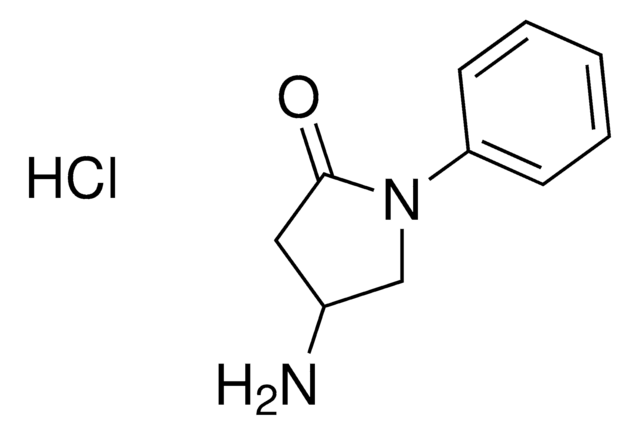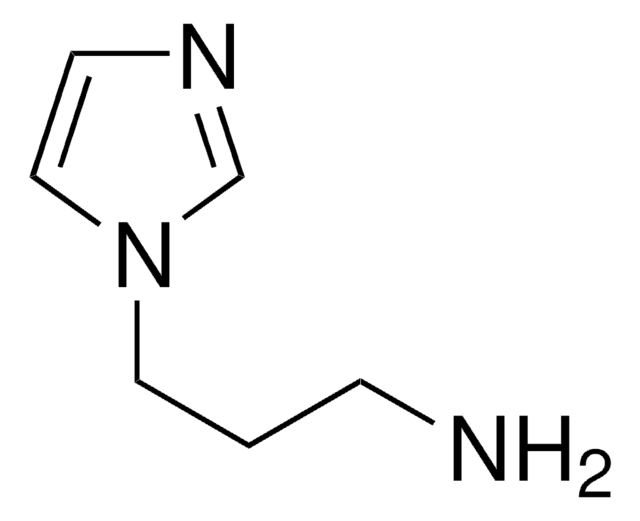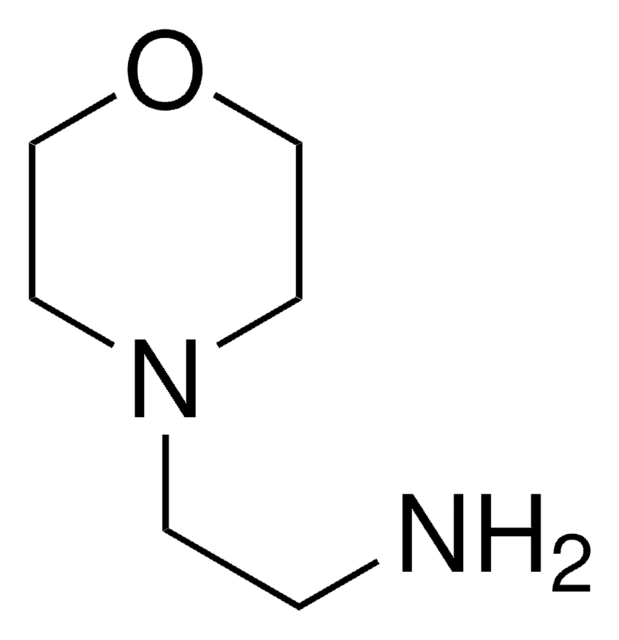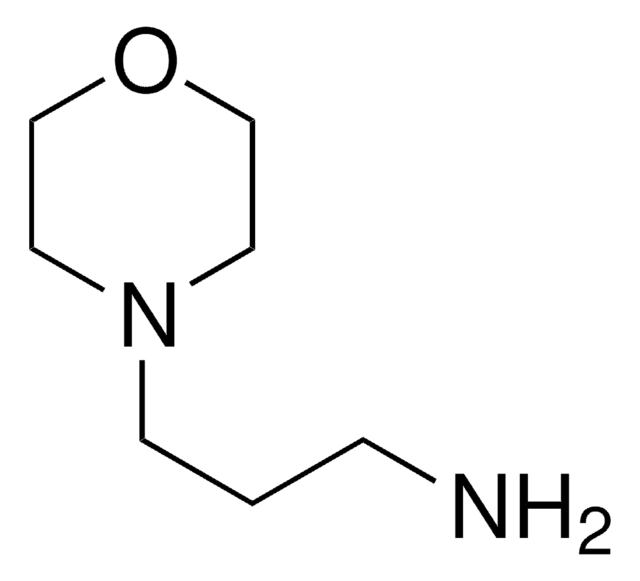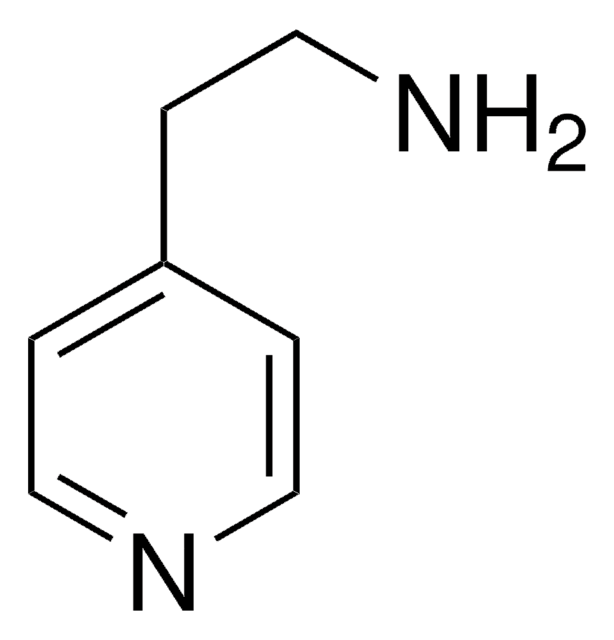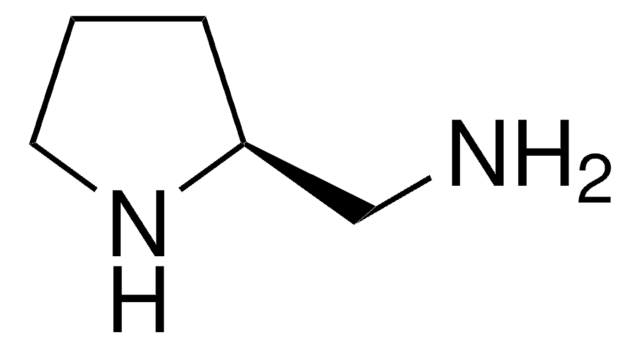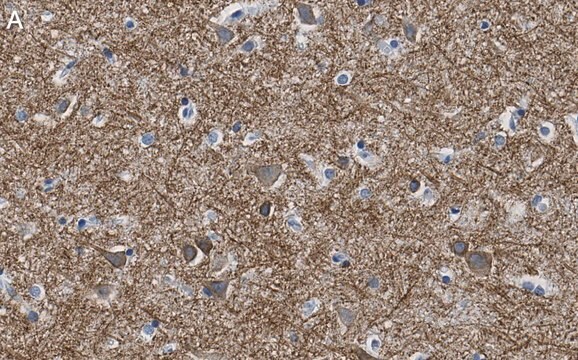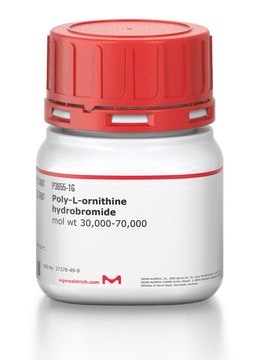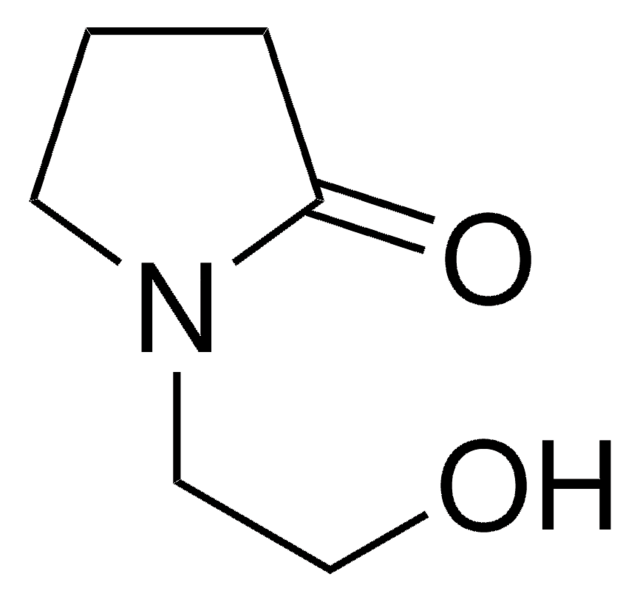136565
N-(3-Aminopropyl)-2-pyrrolidinone
technical grade
Sign Into View Organizational & Contract Pricing
All Photos(1)
About This Item
Empirical Formula (Hill Notation):
C7H14N2O
CAS Number:
Molecular Weight:
142.20
EC Number:
MDL number:
UNSPSC Code:
12352100
PubChem Substance ID:
NACRES:
NA.22
Recommended Products
grade
technical grade
Quality Level
form
liquid
impurities
2% 2-pyrrolidinone
refractive index
n20/D 1.5 (lit.)
bp
120-123 °C/1 mmHg (lit.)
density
1.014 g/mL at 25 °C (lit.)
functional group
amine
SMILES string
NCCCN1CCCC1=O
InChI
1S/C7H14N2O/c8-4-2-6-9-5-1-3-7(9)10/h1-6,8H2
InChI key
HJORCZCMNWLHMB-UHFFFAOYSA-N
Looking for similar products? Visit Product Comparison Guide
General description
N-(3-Aminopropyl)-2-pyrrolidinone (PYR) conjugates (VPA-PYR) of valproic acid (VA) have been investigated for their anticonvulsant activity in mice. It is the γ-lactam form of isoputreanine.
Application
N-(3-Aminopropyl)-2-pyrrolidinone was used in the simultaneous determination of total polyamines and three of their non−α− amino acid metabolites in urine by capillary gas-chromatographic method with nitrogen-phosphorus detection.
Other Notes
Contains varying amounts of 1,5-diazabicyclo[4.3.0]non-5-ene (cat. no. 136581)
Signal Word
Danger
Hazard Statements
Precautionary Statements
Hazard Classifications
Skin Corr. 1B
Storage Class Code
8A - Combustible corrosive hazardous materials
WGK
WGK 3
Flash Point(F)
235.4 °F - closed cup
Flash Point(C)
113 °C - closed cup
Personal Protective Equipment
dust mask type N95 (US), Eyeshields, Gloves
Choose from one of the most recent versions:
Already Own This Product?
Find documentation for the products that you have recently purchased in the Document Library.
Ofer Spiegelstein et al.
Epilepsy research, 57(2-3), 145-152 (2004-03-12)
Valproic acid (VPA) is an effective antiepileptic medication, the use of which in females of childbearing age is complicated by its ability to induce birth defects, including neural tube defects (NTDs), in exposed embryos. In experimental settings, VPA reproducibly induces
N Seiler et al.
The Biochemical journal, 208(1), 189-197 (1982-10-15)
A high-pressure-liquid-chromatographic method suitable for the separation and sensitive detection of putreanine and isoputreanine is described. This method allowed us to study the formation of the metabolites of the oxidative deamination of spermidine and N1-acetylspermidine. Administration of spermidine trishydrochloride to
N Seiler et al.
The International journal of biochemistry, 15(7), 907-915 (1983-01-01)
Normal human and rat urine contain N-(3-aminopropyl)pyrrolidin-2-one. This compound was identified by its chromatographic behaviour on a reversed phase column, by thin-layer chromatography of its dansyl derivative, and by mass spectrometry. Evidence for the presence of conjugates of N-(3-aminopropyl)pyrrolidin-2-one in
Andre P Martinez et al.
Biomacromolecules, 18(6), 2000-2011 (2017-05-20)
A series of biodegradable drug delivery polymers with intrinsic multifunctionality have been designed and synthesized utilizing a polyphosphazene macromolecular engineering approach. Novel water-soluble polymers, which contain carboxylic acid and pyrrolidone moieties attached to an inorganic phosphorus-nitrogen backbone, were characterized by
F A Muskiet et al.
Clinical chemistry, 30(5), 687-695 (1984-05-01)
A capillary gas-chromatographic method with nitrogen-phosphorus detection is used here to simultaneously determine 1,3-diaminopropane, putrescine, cadaverine, spermidine, spermine, isoputreanine , putreanine , and N-(3-aminopropyl)-N'-(2-carboxyethyl)-1,4- diaminobutane in urine. After acid hydrolysis the compounds are isolated by adsorption onto silica gel and
Our team of scientists has experience in all areas of research including Life Science, Material Science, Chemical Synthesis, Chromatography, Analytical and many others.
Contact Technical Service
